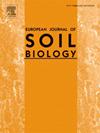Warmer summers have the potential to affect food security by increasing the prevalence and activity of Actinobacteria
IF 3.3
2区 农林科学
Q1 ECOLOGY
引用次数: 0
Abstract
Climate warming impacts agricultural ecosystems in an unpredictable manner. Below-ground microbes are pivotal for aboveground productivity, but their influences on crop productivity in a warming climate are unknown. We conducted a regional-scale field survey in 253 rice‒wheat rotation systems using bacterial 16S amplicon sequencing and satellite-derived crop net primary productivity (NPP) data to investigate the relationships between soil bacteria and crop NPP under different temperatures. Actinobacteria were identified as the main driver of crop NPP, accounting for 4.2 % of the variation, with summer warming accounting for 11.9 % of the increase in their relative abundance. Summer warming resulted in an increase in antibiotic production genes within Actinobacteria, potentially reducing crop productivity by inhibiting seed germination and root elongation and by suppressing plant growth-promoting microorganisms. Taken together, our study indicates that warmer summers are expected to increase the relative abundance of soil Actinobacteria in rice-wheat rotation systems, which will negatively impact crop NPP due to their production of antibiotics that suppress beneficial plant microbes and/or inhibit crop seed germination and root elongation.

温暖的夏季有可能通过增加放线菌的流行和活性来影响粮食安全
气候变暖以不可预测的方式影响农业生态系统。地下微生物对地上生产力至关重要,但它们在气候变暖的情况下对作物生产力的影响尚不清楚。利用细菌16S扩增子测序和卫星获取的作物净初级生产力(NPP)数据,对253个水稻-小麦轮作系统进行了区域尺度的实地调查,探讨了不同温度下土壤细菌与作物净初级生产力(NPP)的关系。放线菌是作物NPP的主要驱动因子,占变化量的4.2%,其中夏季变暖占放线菌相对丰度增加的11.9%。夏季变暖导致放线菌内抗生素生产基因的增加,可能通过抑制种子发芽和根伸长以及抑制植物生长促进微生物来降低作物产量。综上所述,我们的研究表明,温暖的夏季预计会增加稻麦轮作系统中土壤放线菌的相对丰度,这将对作物NPP产生负面影响,因为它们产生的抗生素会抑制有益植物微生物和/或抑制作物种子发芽和根系伸长。
本文章由计算机程序翻译,如有差异,请以英文原文为准。
求助全文
约1分钟内获得全文
求助全文
来源期刊

European Journal of Soil Biology
环境科学-生态学
CiteScore
6.90
自引率
0.00%
发文量
51
审稿时长
27 days
期刊介绍:
The European Journal of Soil Biology covers all aspects of soil biology which deal with microbial and faunal ecology and activity in soils, as well as natural ecosystems or biomes connected to ecological interests: biodiversity, biological conservation, adaptation, impact of global changes on soil biodiversity and ecosystem functioning and effects and fate of pollutants as influenced by soil organisms. Different levels in ecosystem structure are taken into account: individuals, populations, communities and ecosystems themselves. At each level, different disciplinary approaches are welcomed: molecular biology, genetics, ecophysiology, ecology, biogeography and landscape ecology.
 求助内容:
求助内容: 应助结果提醒方式:
应助结果提醒方式:


